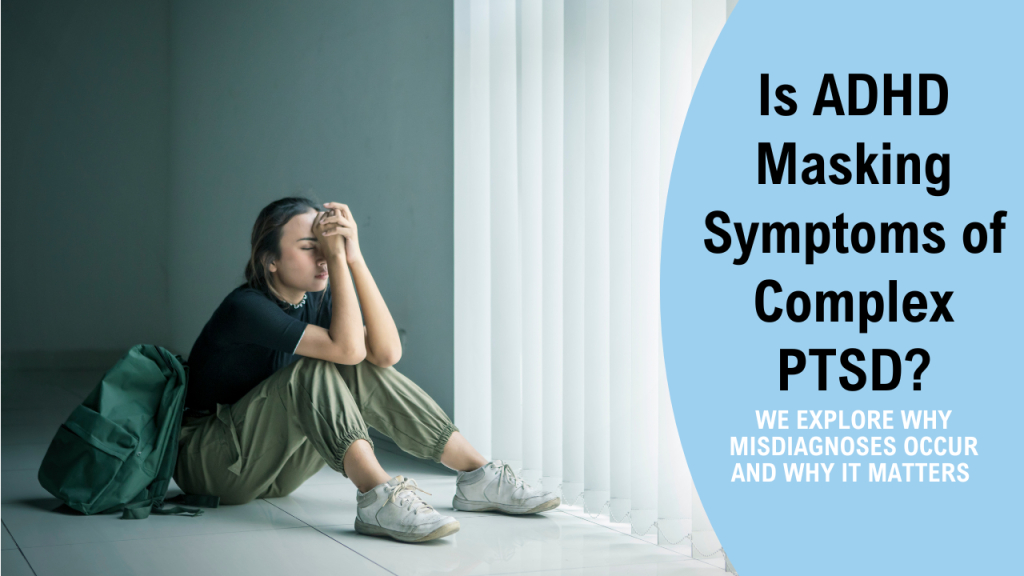
“Everything I Tried Didn’t work…”
When Sarah* finally sat across from a psychologist suggesting a diagnosis of Complex PTSD, she felt a mixture of hope and exhaustion. For years, she’d struggled to keep up with life—losing her keys daily, zoning out during classes, feeling overwhelmed by the smallest tasks. Friends gently joked about her “scattered brain.” Her parents and teachers became frustrated with her missed assignment deadlines.
Sarah had been diagnosed with ADHD early in High School but while she had been in treatment for her ADHD none of the strategies seemed to work for her the way they worked for her classmates with the same diagnosis. She still felt constantly overwhelmed by the constant attacks of life.
With a new diagnosis came a new treatment plan focusing on the right strategies for addressing Sarah’s trauma and she felt like she was finally making progress in life.
Sarah’s experience is not unique—and it highlights an important truth: sometimes what looks like ADHD is masking Complex PTSD (C-PTSD).
How Trauma and ADHD Symptoms Can Overlap
Trauma changes the brain. When someone grows up in an unpredictable or unsafe environment—whether through neglect, emotional abuse, chronic instability, or other forms of adversity—their nervous system adapts to survive.
This survival mode can look a lot like ADHD:
- Struggling to focus because the brain is scanning for threats
- Forgetting tasks or losing items because the brain is overloaded
- Restlessness or impulsivity because of heightened arousal
- Difficulty with emotional regulation
For individuals with C-PTSD, these adaptations aren’t “bad habits” or flaws—they’re survival strategies that once kept them safe.
However, when life becomes safer but the brain is still operating in that same mode, everyday functioning can become overwhelming.
Why ADHD is Sometimes Diagnosed (and Sometimes Missed)
It’s easy to see why clinicians might diagnose ADHD when these symptoms appear. ADHD and trauma responses often show up similarly in behaviour—but their origins, and how they need to be treated, can be quite different.
Key distinctions:
- ADHD is neurodevelopmental—meaning it’s present from a young age, regardless of environment.
- Trauma-related attention difficulties are often contextual—they may fluctuate based on triggers, stress, and emotional safety.
Without careful assessment, it’s easy to misattribute trauma symptoms to ADHD, or only get half the picture when ADHD and C-PTSD are both present. That’s why comprehensive testing and a trauma-informed lens are so critical.
Why This Matters for Healing and Growth
When someone like Sarah is diagnosed with ADHD, there’s a risk that their story—the part carrying hurt and survival—gets overlooked.
- Trauma needs to be honoured. Understanding how your brain adapted to hardship is empowering.
- If both are present ADHD needs to be supported. Strategies need to accommodate both neurodiversity and emotional healing.
- Treatment must be compassionate and tailored. It’s not just about managing symptoms—it’s about creating safety, building new coping skills, and gently reconnecting with parts of yourself that have been in survival mode for too long.
At Creating Change, we see the whole person—not just the diagnosis. Our approach to testing, therapy, and support is built on the belief that your history matters, your experiences matter, and that healing happens when we treat both the surface and the roots.
Moving Forward with Clarity and Compassion
If you’ve ever wondered, “Why can’t I just focus?” or “Why do I always feel like I’m failing at life?”, you are not alone—and it’s not a personal flaw.
Getting a full, thoughtful assessment can be the first step in understanding yourself with kindness instead of criticism.
Just like Sarah, you deserve to see the full picture—and to find a pathway forward that honours everything you’ve been through.
*Name and details changed to protect privacy.
Written by Jessica Chapman – Provisional Psychologist – www.creatingchange.net.au

